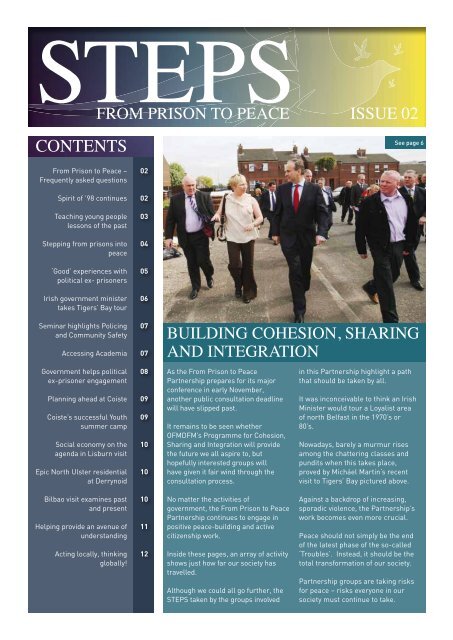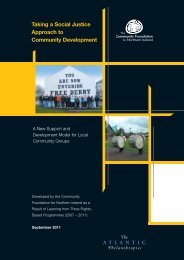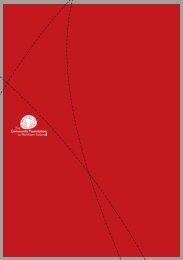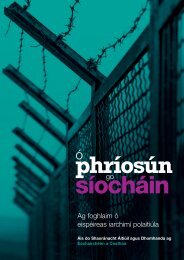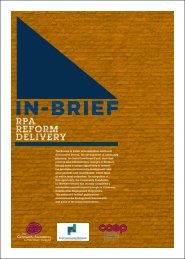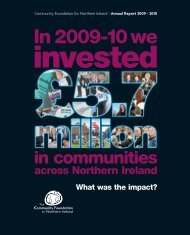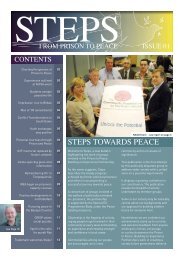Issue 2 - Community Foundation for Northern Ireland
Issue 2 - Community Foundation for Northern Ireland
Issue 2 - Community Foundation for Northern Ireland
You also want an ePaper? Increase the reach of your titles
YUMPU automatically turns print PDFs into web optimized ePapers that Google loves.
ISSUE 02<br />
CONTENTS<br />
See page 6<br />
From Prison to Peace –<br />
Frequently asked questions<br />
Spirit of ’98 continues<br />
Teaching young people<br />
lessons of the past<br />
Stepping from prisons into<br />
peace<br />
‘Good’ experiences with<br />
political ex- prisoners<br />
Irish government minister<br />
takes Tigers’ Bay tour<br />
Seminar highlights Policing<br />
and <strong>Community</strong> Safety<br />
Accessing Academia<br />
Government helps political<br />
ex-prisoner engagement<br />
Planning ahead at Coiste<br />
Coiste’s successful Youth<br />
summer camp<br />
Social economy on the<br />
agenda in Lisburn visit<br />
Epic North Ulster residential<br />
at Derrynoid<br />
02<br />
02<br />
03<br />
04<br />
05<br />
06<br />
07<br />
07<br />
08<br />
09<br />
09<br />
10<br />
10<br />
Building cohesion, sharing<br />
and integration<br />
As the From Prison to Peace<br />
Partnership prepares <strong>for</strong> its major<br />
conference in early November,<br />
another public consultation deadline<br />
will have slipped past.<br />
It remains to be seen whether<br />
OFMDFM’s Programme <strong>for</strong> Cohesion,<br />
Sharing and Integration will provide<br />
the future we all aspire to, but<br />
hopefully interested groups will<br />
have given it fair wind through the<br />
consultation process.<br />
in this Partnership highlight a path<br />
that should be taken by all.<br />
It was inconceivable to think an Irish<br />
Minister would tour a Loyalist area<br />
of north Belfast in the 1970’s or<br />
80’s.<br />
Nowadays, barely a murmur rises<br />
among the chattering classes and<br />
pundits when this takes place,<br />
proved by Micháel Martin’s recent<br />
visit to Tigers’ Bay pictured above.<br />
Bilbao visit examines past<br />
and present<br />
Helping provide an avenue of<br />
understanding<br />
Acting locally, thinking<br />
globally!<br />
10<br />
11<br />
12<br />
No matter the activities of<br />
government, the From Prison to Peace<br />
Partnership continues to engage in<br />
positive peace-building and active<br />
citizenship work.<br />
Inside these pages, an array of activity<br />
shows just how far our society has<br />
travelled.<br />
Although we could all go further, the<br />
STEPS taken by the groups involved<br />
Against a backdrop of increasing,<br />
sporadic violence, the Partnership’s<br />
work becomes even more crucial.<br />
Peace should not simply be the end<br />
of the latest phase of the so-called<br />
‘Troubles’. Instead, it should be the<br />
total trans<strong>for</strong>mation of our society.<br />
Partnership groups are taking risks<br />
<strong>for</strong> peace – risks everyone in our<br />
society must continue to take.
From Prison<br />
to Peace –<br />
Frequently<br />
asked<br />
questions<br />
What is the From Prison to Peace<br />
Partnership?<br />
From Prison to Peace is a partnership<br />
funded under the European Union’s<br />
Peace III Measures. It combines local,<br />
political ex-prisoners support groups<br />
to work between 2009-2011 on key<br />
issues <strong>for</strong> this community of interest.<br />
The Partnership is administrated by the<br />
<strong>Community</strong> <strong>Foundation</strong> <strong>for</strong> <strong>Northern</strong><br />
<strong>Ireland</strong>.<br />
Who is involved?<br />
The key support organizations from<br />
the five main groups identified with the<br />
conflict here are represented on the<br />
Partnership. These groups include the<br />
Provisional IRA, the Official IRA, the<br />
INLA, the UVF and UDA.<br />
Who are the key political ex-prisoner<br />
support groups?<br />
• Coiste na Iarchimi is the umbrella<br />
organization <strong>for</strong> support groups <strong>for</strong><br />
Provisional IRA political ex-prisoners.<br />
• An Eochair represents political exprisoners<br />
from the Official IRA.<br />
• Teach na Failte represent political exprisoners<br />
from the INLA/IRSP.<br />
• Epic and The Hubb represent political<br />
ex-prisoners from the UVF.<br />
• UDA ex-political prisoners are<br />
represented by Charter <strong>for</strong> <strong>Northern</strong><br />
<strong>Ireland</strong>, Prisoners in Partnership,<br />
Belfast South <strong>Community</strong><br />
Resources, North Belfast<br />
<strong>Community</strong> and Transition Group<br />
and Lisburn Prisoners Support<br />
Project.<br />
What is the Partnership intended to do?<br />
Work across three key themes:<br />
• Conflict trans<strong>for</strong>mation and peace<br />
building<br />
• Youth development and citizenship<br />
• Promoting social change<br />
Spirit of ’98 continues<br />
Members of the Prison to Peace<br />
Partnership have completed a tour of<br />
sites connected to the 1798 uprising.<br />
Conducted by guide Phillip Orr, a<br />
descendant of rising leader William<br />
Orr, the tour took in sites around<br />
Belfast, including Clifton Street<br />
Cemetery where United Irishmen<br />
like William Drennan and Henry Joy<br />
McCracken are buried and Mac Airt’s<br />
Fort, at the summit of Ben Madigan.<br />
Sites connected with the Battle of<br />
Antrim were also visited, as well as<br />
the gravesides of Jemmy Hope at<br />
2<br />
Templepatrick and William<br />
Orr at Mallusk.<br />
Members of each of the<br />
groups in the Partnership<br />
attended and it proved so<br />
successful that another<br />
trip was arranged, this time<br />
to visit sites of historical<br />
interest in Co. Wex<strong>for</strong>d.<br />
40 representatives<br />
took part in the delegation<br />
organized by Teach Na<br />
Failte, including 20 young<br />
people.<br />
Delegates take part in 1798 tour
Teaching<br />
young people<br />
lessons of<br />
the past<br />
Education Minister Caitriona Ruane with <strong>Community</strong> <strong>Foundation</strong> Chair Tony<br />
McCusker and Queen’s University’s Lesley McEvoy<br />
Political ex-prisoners are helping<br />
young people learn lessons from our<br />
troubled past through a new learning<br />
pack <strong>for</strong> schools.<br />
From Prison to Peace – Learning<br />
from the experiences of political-ex<br />
prisoners, has been produced with the<br />
help of Lesley McEvoy from the School<br />
of Education at Queen’s University,<br />
Belfast.<br />
Developed as a resource <strong>for</strong> Local and<br />
Global Citizenship at Key Stage 4, the<br />
pack was<br />
launched<br />
at a special<br />
event at the<br />
<strong>Northern</strong><br />
<strong>Ireland</strong><br />
Council <strong>for</strong><br />
Voluntary<br />
Action<br />
(NICVA) on<br />
June 4.<br />
Education Minister<br />
Caitriona Ruane<br />
Former political prisoners working<br />
as part of the From Prison to Peace<br />
– Building on Experience Partnership<br />
helped develop the pack.<br />
Minister <strong>for</strong> Education, Caitriona<br />
Ruane MLA, was on hand to launch<br />
the programme.<br />
The Office of the First and Deputy<br />
First Minister <strong>for</strong> <strong>Northern</strong> <strong>Ireland</strong><br />
also work on issues relating to the<br />
role of political ex-prisoners and<br />
Bruce Robinson, Head of the <strong>Northern</strong><br />
<strong>Ireland</strong> Civil Service, provided a<br />
<strong>for</strong>eword <strong>for</strong> the pack, as did the<br />
<strong>for</strong>mer Methodist President, the Rev.<br />
Harold Good, who witnessed the<br />
decommissioning of IRA weapons.<br />
Lesley Mc Evoy said; “As a resource<br />
<strong>for</strong> local schools, this special pack<br />
will be of use to teachers working to<br />
encourage active citizenship.<br />
“While its content is challenging, we<br />
know from experience that young<br />
people are keen to explore these<br />
issues.<br />
“The activities are split into three<br />
sections based on the narratives of a<br />
number of political ex-prisoners, and<br />
cover three key themes; Becoming<br />
involved in the conflict, Understanding<br />
the prison experience and Contributing<br />
to Conflict Trans<strong>for</strong>mation and<br />
<strong>Community</strong> Development.<br />
“Some of our young people remain<br />
involved in activities detrimental<br />
to their communities and this is a<br />
way to engage them in community<br />
development and conflict<br />
trans<strong>for</strong>mation, including issues like<br />
interface violence.<br />
“All the <strong>for</strong>mer political prisoners<br />
groups involved in this project support<br />
the peace process and want to share<br />
their experiences with young people<br />
to demystify romantic or ill-in<strong>for</strong>med<br />
notions of conflict and the prison<br />
experience.<br />
“We’re delighted the Minister <strong>for</strong><br />
Education attended to hear how this<br />
resource can help reduce community<br />
tension and build a future <strong>for</strong> our<br />
young people free from the stresses<br />
of the past.”<br />
Margaret McTeggart, the <strong>Community</strong><br />
<strong>Foundation</strong> <strong>for</strong> <strong>Northern</strong> <strong>Ireland</strong>’s<br />
<strong>Community</strong> Support Officer <strong>for</strong><br />
Peace III projects, said; “Initiatives<br />
like this are incredibly positive<br />
and can leave a lasting impact on<br />
the young people benefiting from<br />
interaction with the <strong>for</strong>mer political<br />
prisoners.<br />
“A DVD production accompanies<br />
the pack to illustrate the personal<br />
nature of conflict and the<br />
contributors will no doubt strike<br />
a personal<br />
chord with<br />
participants.<br />
“Our thanks<br />
as always<br />
go to the<br />
European<br />
Union, whose<br />
Peace III<br />
Programme Coiste’s Danny Murphy<br />
has<br />
funded the Prison to Peace<br />
Partnership Building on Experience<br />
Partnership.”<br />
From Prison to Peace – Learning<br />
from the experiences of politicalex<br />
prisoners will be rolled out to<br />
schools over the next academic year.<br />
Youth clubs and providers will also<br />
be targeted to spread the impact of<br />
the scheme.<br />
3
Stepping from prisons into peace<br />
Former enemies met in March at a<br />
special conference at the Mount Errigal<br />
Hotel in Letterkenny.<br />
Entitled What Difference – now and<br />
post 2011? the conference brought<br />
together <strong>for</strong>mer politically-motivated<br />
prisoners from the UDA, UVF, Official<br />
IRA Provisional IRA and the INLA.<br />
The groups involved consolidated<br />
conflict-trans<strong>for</strong>mation work, in which<br />
they’ve been collectively engaged over<br />
the last few years,<br />
The From Prison to Peace Partnership<br />
has gone from strength to strength,<br />
with participant groups embedding<br />
the peace process within their<br />
constituencies and building new<br />
relationships within and between<br />
communities, north and south of the<br />
border.<br />
Over the past 18 months, this work has<br />
focussed on conflict trans<strong>for</strong>mation,<br />
active citizenship and social change<br />
leadership.<br />
The trust and confidence-building<br />
measures inherent to the programme<br />
have also played a significant role in the<br />
recent decisions by the UDA, INLA and<br />
Official IRA to put weapons beyond use.<br />
As well as furthering the work of the<br />
<strong>for</strong>mer-prisoner network, the Mount<br />
Errigal conference launched this<br />
magazine Steps – From Prison to<br />
Peace, highlighting positive activities<br />
undertaken by the Partnership.<br />
Speaking on behalf of delegates, Adie<br />
Bird of Lisburn Prisoners’ Support<br />
Project, said; “All the groups involved<br />
in the Prison to Peace Partnership are<br />
dedicated to finding new pathways to<br />
engagement, creating a stable and<br />
settled atmosphere in communities<br />
across <strong>Northern</strong> <strong>Ireland</strong>.<br />
Delegates at the Letterkenny conference<br />
“Conferences like these are important<br />
milestones in that process.<br />
“They allow us to focus on important<br />
issues in a neutral environment and<br />
tap into skills and resources from other<br />
experts that in<strong>for</strong>m our decision making<br />
and future planning.<br />
“Despite our differences, we have much<br />
in common.<br />
“Away from the political structures at<br />
Stormont, everyone has a part to play<br />
in creating a better <strong>Northern</strong> <strong>Ireland</strong><br />
and <strong>for</strong>mer political prisoners have a<br />
Peace on the agenda<br />
vital role in sharing experiences so we<br />
never go back to the past.”<br />
The What Difference – now and post<br />
2011? conference saw participation<br />
from many figures well known in the<br />
field of peace making.<br />
Panel discussion participants<br />
included the Rev. Harold Good,<br />
who witnessed the historic IRA<br />
decommissioning process, Derry<br />
journalist and civil rights activist<br />
Eamonn McCann and <strong>for</strong>mer prison<br />
governor, William McKee.<br />
4
‘Good’ experiences with political<br />
ex-prisoners<br />
Rev. Harold Good is a <strong>for</strong>mer President<br />
of the Methodist Church in <strong>Ireland</strong><br />
and witnessed the completion of<br />
IRA decommissioning. A recent<br />
participant at the From Prison to Peace<br />
conference in Donegal, Rev. Good<br />
outlines his positive experiences of<br />
engaging with political ex-prisoners.<br />
For those of us who lived through<br />
these turbulent years of political<br />
turmoil, violence and counterviolence,<br />
it can be difficult to remain<br />
objective in our judgements of people<br />
and events.<br />
This is why those of us serious about<br />
building a lasting peace need to take<br />
advantage of every opportunity to<br />
engage with those who have been<br />
held responsible <strong>for</strong> much of what<br />
took place during our troubled<br />
years, from whatever side they may<br />
have come.<br />
This is how I found myself at a<br />
residential conference organised by<br />
the From Prison to Peace Partnership.<br />
Any anxiety I may have had about<br />
how I might be perceived by the<br />
participants, soon proved to be<br />
entirely groundless.<br />
The welcome was warm and genuine,<br />
irrespective of the background of the<br />
person with the outstretched hand.<br />
In one sense, it was an unlikely<br />
grouping that filled the lobby with<br />
good humour, but we were there <strong>for</strong><br />
serious business - a common quest<br />
with a shared commitment to put the<br />
past where it belonged.<br />
The fact that amongst us were names<br />
and faces of those well known <strong>for</strong><br />
their part in our recent history clearly<br />
added to the significance and value of<br />
the event.<br />
Here, we were able to converse WITH<br />
each other, rather than ABOUT each<br />
other!<br />
As we listened to presentations<br />
representing a spectrum of views<br />
there was total respect, even when<br />
there was no agreement.<br />
In smaller discussion groups, had<br />
I not previously known some of the<br />
participants, I would have been hardput<br />
to identify the organisation or<br />
party from which they came.<br />
What mattered was not the<br />
justification of any past event or the<br />
defence of one’s own position, but<br />
what together could be achieved <strong>for</strong><br />
the future,<br />
For example, those from totally<br />
different political and<br />
paramilitary backgrounds<br />
discussing how best<br />
they could ‘manage’<br />
the volatile inter-face<br />
situation in their local<br />
area, particularly during<br />
the up-coming marching<br />
season.<br />
For me, it was not without<br />
significance that this was<br />
one of<br />
the potential ‘flash-points’<br />
where there was no<br />
reported trouble this year,<br />
but, as ever, this wasn’t<br />
deemed newsworthy!<br />
I came away from this<br />
event wishing it could<br />
Rev. Harold Good<br />
have been broadcast to the world, but<br />
<strong>for</strong> obvious reasons this would have<br />
been neither possible nor wise.<br />
This was the kind of conversation that<br />
can only take place in an atmosphere<br />
of trust, away from the glare of<br />
publicity and out of the reach of<br />
those who would try to undermine or<br />
exploit the value of what was taking<br />
place.<br />
Still, I could not help contrasting<br />
this experience with conversations<br />
I have overheard in other places,<br />
between those who have not been<br />
involved in nor directly touched by the<br />
violence of the past - let alone been in<br />
Maghaberry, ‘the Crum’ or the Maze !<br />
Of course, I do understand from<br />
where they too are coming, but it is<br />
time <strong>for</strong> all of us to break free from<br />
‘prisons’ of different kinds so that,<br />
together, we will be fee to build a<br />
lasting peace.<br />
5
Irish government minister<br />
takes Tigers’ Bay tour<br />
Artist Ross Wilson (left) with the Irish Foreign Minister<br />
It’s not everyday an Irish government<br />
Minister gets to pound the pavement<br />
of a Loyalist area, but that’s exactly<br />
what happened recently when Micháel<br />
Martin came to Belfast.<br />
Accompanied by a delegation from<br />
the International Fund <strong>for</strong> <strong>Ireland</strong>, the<br />
Irish Foreign Minister heard first hand<br />
about the issues affecting the Tigers’<br />
Bay community in the north of the city.<br />
Organsied and facilitated by<br />
Groundwork NI, a guided tour of the<br />
‘Bay’ was conducted by the North<br />
Belfast <strong>Community</strong> Development &<br />
Transition Group, after a tour of the<br />
nearby New Lodge community.<br />
Various key issues were highlighted,<br />
including the re-imaging project,<br />
which created extensive consultation<br />
workshops, resulting in the removal of<br />
UDA associated murals in the area.<br />
Artist Ross Wilson gave an insight into<br />
the work with young people from Currie<br />
Primary School and Mountcollyer<br />
Youth Club, who designed new murals<br />
giving a positive and vibrant community<br />
identity to inspire new aspirations.<br />
Various important issues were<br />
highlighted,<br />
including policing/<br />
community safety<br />
partnerships, anti drug<br />
campaigns, housing<br />
and regeneration<br />
initiatives and interface<br />
engagement projects.<br />
The Minister was<br />
impressed to hear<br />
Leanne Marshall from<br />
the North Belfast<br />
<strong>Community</strong> and<br />
Development Transition<br />
Group outline the<br />
Minister Martin takes in Tigers’ Bay<br />
community led regeneration strategy<br />
to address difficulties in the area<br />
traditionally blighted by conflict,<br />
marginalisation and disconnection<br />
from wider society.<br />
John Howcroft and Sam Cochrane<br />
outlined ongoing interface work,<br />
relating how building both personal<br />
and organisational relationships<br />
have developed trust and common<br />
visions, leading to new partnerships<br />
between the business, community and<br />
statutory sectors, which has created<br />
an ‘enabling’ environment.<br />
One particular event highlighted by<br />
John and Sam brought 250 residents<br />
from adjacent communities together.<br />
After the tour of Tigers’ Bay, a<br />
range of community leaders, church<br />
representatives and statutory partners<br />
met at Groundwork NI to analyze<br />
progress and new challenges, with<br />
John Bunting providing a strategic<br />
overview of the work of the North<br />
Belfast <strong>Community</strong> and Development<br />
Transition Group and the obstacles<br />
remaining in building a community<br />
based on social justice <strong>for</strong> all.<br />
6
Accessing Academia<br />
Seminar<br />
highlights<br />
Policing and<br />
<strong>Community</strong><br />
Safety<br />
Queen’s University<br />
A recent meeting took place between<br />
members of the Prison to Peace<br />
Partnership and key academics at<br />
Queen’s University, Belfast.<br />
Organised by the Office of the First and<br />
Deputy First Minister, the constructive<br />
meeting allowed academics across<br />
several faculties to meet with political<br />
ex-prisoners in a joint capacity to<br />
discuss areas of mutual interest.<br />
Linsey Farrell, who heads OFMDFM’s<br />
ex-political prisoner Communications<br />
Sub Group stressed it was important<br />
to get quality in<strong>for</strong>mation on research<br />
to help in<strong>for</strong>m current activities and<br />
campaigns.<br />
Dr. Peter Shirlow, from the Queen’s<br />
University School of Law, Chaired<br />
the meeting, which also included<br />
academics from the schools of Social<br />
Sciences and Criminology.<br />
A trawling exercise is under way to<br />
collate the various pieces of research<br />
on the issues affecting ex-political<br />
prisoners and their families over two<br />
decades.<br />
These items will then be placed<br />
in a reserved section in the Henry<br />
Collection at Queen’s Library, to aid<br />
other researchers pursuing related<br />
issues.<br />
Lord Alderdice and Alison White, from the<br />
Independent Monitoring Commission at the<br />
seminar.<br />
<strong>Community</strong> <strong>Foundation</strong> Director<br />
Avila Kilmurray chaired a special<br />
North Belfast <strong>Community</strong><br />
Development and Transition Group<br />
seminar in September.<br />
Focusing on continuing work<br />
in partnerships with the wider<br />
community, the event highlighted the<br />
considerable progress and diversity<br />
of work conducted with a wide range<br />
of stakeholders.<br />
Organised around the theme of<br />
Policing and <strong>Community</strong> Safety,<br />
key personnel from specific<br />
organizations detailed the impact<br />
their work was having on the wider<br />
community.<br />
A large amount of time was also<br />
given over to questions and answers<br />
and direct feedback.<br />
Attendees included statutory<br />
agencies, government<br />
representatives and other<br />
community groups, all of whom<br />
felt they gained greater insight<br />
into the work of the North Belfast<br />
<strong>Community</strong> Development and<br />
Transition Group.<br />
7
Stormont<br />
Government helps political<br />
ex-prisoner engagement<br />
At Stormont, the Office of the First<br />
and Deputy First Ministers has taken<br />
responsibility <strong>for</strong> examining issues<br />
regarding political ex-prisoners.<br />
Some years ago, the Ex-Prisoners<br />
Working Group was established<br />
to consider barriers facing people<br />
with conflict-related convictions in<br />
accessing employment, facilities,<br />
goods and services.<br />
This group was instrumental in<br />
the production of the Employers’<br />
Guidance on Recruiting People with<br />
Conflict-Related Convictions, issued<br />
in May 2007, prior to the restoration of<br />
devolution.<br />
Meeting on a quarterly basis,<br />
employment continues to be a<br />
priority area <strong>for</strong> the group but the<br />
need to engage with wider society by<br />
communicating positive messages on<br />
the contributions of ex-prisoners has<br />
also emerged as a key priority.<br />
In recognition of the importance of<br />
effective communication, a subgroup<br />
of the Ex-Prisoners Working Group<br />
has been established to focus on<br />
developing in<strong>for</strong>mation materials<br />
to communicate with external<br />
stakeholder groups.<br />
The In<strong>for</strong>mation & Communication<br />
subgroup draws membership from<br />
An Eochair, Charter NI, Coiste, EPIC,<br />
Teach na Failte, and <strong>Community</strong><br />
<strong>Foundation</strong> <strong>for</strong> NI, and has agreed<br />
the following core objectives:<br />
Developing in<strong>for</strong>mation resources<br />
that clearly outline key issues<br />
impacting on people with conflictrelated<br />
convictions and their<br />
families;<br />
Identifying key audiences and their<br />
related in<strong>for</strong>mation needs;<br />
Developing a communication plan<br />
that sets out steps <strong>for</strong> engagement<br />
with wider stakeholders.<br />
An in<strong>for</strong>mation paper has been<br />
developed, along with a presentation,<br />
<strong>for</strong> use in engaging with wider<br />
stakeholders, while the subgroup<br />
recently held its first in<strong>for</strong>mation<br />
session <strong>for</strong> staff in the Equality<br />
Commission NI.<br />
This event was widely judged to have<br />
been very successful in publicising<br />
positive contributions made by exprisoners,<br />
while raising awareness of<br />
the barriers they can face in relation<br />
to employment and other issues.<br />
Academia has also been a focus,<br />
with a recent meeting at Queen’s<br />
University Belfast was very productive,<br />
helping crystallize research on<br />
relevant issues.<br />
In June of this year a reception was<br />
held <strong>for</strong> Public Sector Employers on<br />
the issue of recruitment of people<br />
with conflict-related convictions.<br />
Constructive meetings have also<br />
taken place in recent months with<br />
the Association of British Insurers, as<br />
well as representatives from Allianz<br />
and Zurich.<br />
In the upcoming period, the subgroup<br />
intends to hold discussions with<br />
other key stakeholders in order to<br />
identify any opportunities to promote<br />
more positive messages about the<br />
contribution of ex-prisoners to wider<br />
society.<br />
8
Planning<br />
ahead at<br />
Coiste<br />
A special residential was held recently<br />
<strong>for</strong> the 13 projects in the Coiste<br />
network.<br />
Examining issues around Peace III<br />
funding from 2011 onward, the two<br />
day event was very well attended, with<br />
all groups participating in workshop<br />
settings.<br />
Guest speakers at the event included<br />
David Clarke from the Special European<br />
Programmes Body, who outlined his<br />
organization’s vision <strong>for</strong> the future<br />
funding of the sector.<br />
Pictured recently at the Coiste na nIarchimí planning residential are Cormac McAleer<br />
(<strong>Community</strong> <strong>Foundation</strong>), Kevin Mulgrew (Coiste Vice Chair), Michael Culbert (Coiste Director),<br />
Bairbre De Brúin, (MEP), Frankie Gallagher, Charter and David Clarke (SEUPB)<br />
Cormac McAleer from the <strong>Community</strong><br />
<strong>Foundation</strong> <strong>for</strong> <strong>Northern</strong> <strong>Ireland</strong> spoke of<br />
his organisations long term relationship<br />
with Coiste and of the <strong>Foundation</strong>’s<br />
perspective on the continuation of that<br />
relationship.<br />
Charter’s Frankie Gallagher reflected on<br />
the long-term, active working between<br />
his group and Coiste in the arenas of<br />
youth work and general peace building.<br />
Finally, Member of the European<br />
Parliament Baibre DeBrúin gave<br />
an in-depth perspective on the EU,<br />
opportunities <strong>for</strong> funding and the<br />
gradual slow down of EU funds <strong>for</strong> the<br />
such projects in the future.<br />
Coiste’s successful Youth summer camp<br />
A very successful two-day Coiste Youth<br />
Summer Camp was recently held at<br />
the Clinton Centre in Enniskillen, Co<br />
Fermanagh.<br />
Young people from across <strong>Ireland</strong> attended<br />
the two-day seminar and workshops.<br />
The first seminar was facilitated by Joe<br />
Doherty, whose presentation was based<br />
around the history of imprisonment, from<br />
Internment to the H Block protests.<br />
Joe also touched on the educational and<br />
self-development strategies within the<br />
prison and the discussion documents<br />
around political developments, including<br />
the peace strategy and understanding of<br />
diversity.<br />
The <strong>Northern</strong> <strong>Ireland</strong> Children’s Commissioner at Coiste’s youth summer camp.<br />
Lively questions and answers sessions<br />
followed each of the presentations.<br />
Next, Children’s Commissioner Patricia<br />
Lewsley gave a detailed breakdown of local<br />
policy and strategies, taking into account<br />
young people affected by the conflict,<br />
including the children of <strong>for</strong>mer political<br />
prisoners.<br />
Coiste Director Michael Culbert followed<br />
up by presenting Coiste’s strategies on<br />
family support and counselling.<br />
He highlighted the long-term,<br />
psychological nature of parent/child<br />
relationships and the need <strong>for</strong> research<br />
and investment <strong>for</strong> families suffering<br />
from conflict related trauma.<br />
Danny Murphy introduced the Left in<br />
Limbo document and went through the<br />
many interviews with political ex<br />
prisoners’ family members which<br />
highlighted the stresses and strains on<br />
family relationships.<br />
Ms Lewsley recognized the traumatic<br />
experiences of the children of political<br />
prisoners and political ex-prisoners and<br />
acknowledged the findings of the Left in<br />
Limbo document.<br />
Danny Murphy reminded the Children’s<br />
Commissioner of the launch of the<br />
Prison to Peace educational package <strong>for</strong><br />
schools and urged her to support the<br />
programme.<br />
9
Epic North Ulster<br />
residential at Derrynoid<br />
Truth recovery was an issue which<br />
prompted debate as the group looked<br />
at examples from South Africa and<br />
the work of the Historical Enquiries<br />
Team in recent years was examined.<br />
There was even a suggestion that<br />
there should be a museum here to<br />
help us deal with our troubled past.<br />
Delegates talk conflict trans<strong>for</strong>mation at Derrynoid conference<br />
Draperstown hosted an important<br />
recent seminar between Epic North<br />
Ulster and Teach Na Failte.<br />
Aimed at dissecting major issues<br />
facing communities in the North West,<br />
the event followed a similar initiative<br />
held last December.<br />
Facilitated externally by Michael<br />
Doherty and Shirley Bruce, who<br />
have a track record in peace and<br />
reconciliation work, part of the<br />
discussion focused on parading,<br />
with case studies presented on actual<br />
events.<br />
Innovative uses of role plays allowed<br />
delegates to get an in-depth feel <strong>for</strong><br />
the issue of parades, while bottom up<br />
approaches to dealing with the past<br />
were also touched on.<br />
Policing and justice, the economy and<br />
the Review of Public Administration were<br />
dealt with, as was the Comprehensive<br />
Spending Review, the Stormont Assembly,<br />
power sharing and devolved government.<br />
After an examination of the Bloody<br />
Sunday enquiry, there was an<br />
opportunity <strong>for</strong> questions and<br />
feedback which proved very valuable.<br />
Delegates felt that myths were<br />
dispelled and that much common<br />
ground existed on social and<br />
economic issues.<br />
Plans are underway <strong>for</strong> a third<br />
session, to be held at the Boyne<br />
Visitors Centre and locations in<br />
Dublin, to examine key events in<br />
<strong>Ireland</strong> dating back centuries.<br />
An atmosphere of respect,<br />
understanding and trust has been<br />
fostered and hopefully future events<br />
will prove equally successful.<br />
Social economy on the<br />
agenda in Lisburn visit<br />
An Eochair, the support group <strong>for</strong><br />
<strong>for</strong>mer Official republican prisoners,<br />
has received an insight into social<br />
economy projects in Lisburn.<br />
On a recent visit, representatives from<br />
the group toured the Old Warren estate<br />
in the company of Aidie Bird and Collin<br />
Halliday from the Lisburn Prisoners<br />
Support Project.<br />
Touring the social economy projects,<br />
An Eochair’s delegation was keen<br />
to examine issues around building<br />
successful social economy schemes,<br />
like set-up costs and operating<br />
problems.<br />
Touring social economy projects<br />
The July visit was considered very<br />
worthwhile.<br />
10
Unions provide an ‘avenue of understanding’<br />
This public educational process is as<br />
important as the other processes which<br />
surround us all.<br />
Part of that process is STEPS magazine<br />
and the varied initiatives outlined in its<br />
pages.<br />
Ex-political prisoners and trade union representatives putting issues on the agenda at the<br />
EU, with Peter Bunting (centre, white shirt)<br />
Peter Bunting is Assistant General<br />
Secretary of the Irish Congress of Trade<br />
Unions and a long-time advocate on<br />
the issues of political ex-prisoners.<br />
Here, he gives his own views on<br />
the importance of an ‘avenue of<br />
understanding’ to those beyond the<br />
political ex-prisoner community.<br />
In France, when an offender commits and<br />
is found guilty of a particularly heinous<br />
crime, not only are they imprisoned, but<br />
there is an added layer to punishment.<br />
They are stripped of their French<br />
citizenship.<br />
This means more than being deprived<br />
of the right to vote, it means not being<br />
able to call themselves ‘French’. They<br />
are outcasts, <strong>for</strong>ever marked as different<br />
from tribe, nation, community, even<br />
family.<br />
There is no pardon or remission. They are<br />
permanently excluded.<br />
Other societies have less <strong>for</strong>mal, yet<br />
effective <strong>for</strong>ms of exclusion. It is common<br />
in most states <strong>for</strong> serving prisoners to<br />
have no right to vote.<br />
In more punitive states, rights like the<br />
franchise are withdrawn <strong>for</strong>ever from<br />
those who have paid their ‘debt to<br />
society’, long after their release.<br />
In this region of Europe, ex-prisoners are a<br />
constant ‘hot topic’ <strong>for</strong> debate. The problem<br />
is the terms of the debate are usually rigged,<br />
depending on who is speaking.<br />
The communities where most ex-prisoners<br />
grew up and live tend to be the most<br />
understanding of the challenges facing men<br />
and women released from prison.<br />
Communities where few of their sons and<br />
daughters ‘did time’ tend to be the most<br />
un<strong>for</strong>giving.<br />
Most public discussions about justice,<br />
conditions, restorative justice and other<br />
alternatives tend also to be dominated by<br />
people from the latter communities.<br />
Those are the also communities which<br />
tend to be pandered to by those seeking<br />
elected office.<br />
The biggest reason why this difference<br />
prevails is human contact. People who ring<br />
radio talk shows and moan about prisons<br />
being like ‘holiday camps’ are unlikely to<br />
have seen the inside of one, let alone the<br />
bleak, grey and unwelcoming facilities<br />
provided <strong>for</strong> families visiting inmates at<br />
Maghaberry or the H-Blocks and cages of a<br />
generation ago.<br />
However ignorant such people may seem<br />
to the friends and families of ex-prisoners,<br />
they should be reached out to and educated.<br />
We in the trade union movement play<br />
our part by engaging with political<br />
ex-prisoners and those others who<br />
disapprove of ex-political prisoners.<br />
Many of our members and activists in<br />
the trade union movement have friends<br />
and family who have been in prison,<br />
while some of our best activists have<br />
been behind bars at some stage.<br />
This is not surprising when it is<br />
considered around 30,000 people were<br />
imprisoned directly due to the political<br />
situation of our troubled decades.<br />
The backbone of the trade union<br />
movement is comprised of the same<br />
communities from which most of the<br />
combatants emerged – those which<br />
also had the greatest numbers of<br />
victims in the conflict<br />
We strive to provide an avenue of<br />
understanding along which traffic<br />
moves both ways, but the destination<br />
ought to be the same - a society in<br />
which social and political exclusion is<br />
excluded.<br />
A shared society, where petty barriers<br />
preventing the full integration of<br />
ex-prisoners are lifted and where the<br />
prison experience stands as both an<br />
examination of our history and a lesson<br />
to future generations to avoid, can be<br />
built.<br />
I commend this project of<br />
understanding and outreach and look<br />
<strong>for</strong>ward to the continued work of the<br />
fine initiatives outlined and promoted in<br />
the pages of STEPS.<br />
11
Acting locally,<br />
thinking<br />
globally!<br />
Gerard Foster from Teach na Failte<br />
outlines his organisation’s international<br />
relations with groups affected by<br />
conflict from around the world.<br />
For a number of years, Teach<br />
Na Failte has been involved in<br />
international projects with groups<br />
from conflict and post conflict<br />
countries.<br />
These groups include, among others,<br />
Afghans, Indonesians, Philippinos<br />
and Africans.<br />
Middle Eastern groups have<br />
also been involved, including the<br />
Combatants <strong>for</strong> Peace and the<br />
Parent Circle Families Forum, both<br />
made up of people from Israel and<br />
Palestine.<br />
Former and still serving military<br />
personnel from both the Israeli<br />
Defence Forces (IDF) and the<br />
Palestinian Liberation Organisation<br />
(PLO) are involved with Combatants<br />
<strong>for</strong> Peace – each believes violence is<br />
not the way to solve the problems in<br />
their region.<br />
Teach Na Failte has met this group<br />
a number of times in <strong>Ireland</strong>, while I<br />
have met them in the Middle East.<br />
Support from the Irish Ambassador<br />
to Israel allowed me to attend the<br />
Jerusalem Film Festival to speak<br />
about our work in <strong>Ireland</strong> and Teach<br />
na Failte will also speak at the<br />
International Combatants <strong>for</strong> Peace<br />
conference in Italy this October.<br />
The Parent Circle Families Forum is<br />
a group of people, again from both<br />
Palestine and Israel, who have lost<br />
loved ones in that conflict.<br />
Teach Na Failte first met this group<br />
about two years ago and has continued<br />
the relationship since.<br />
Three days of workshops also<br />
took place in August, in which I<br />
participated.<br />
Held in a village called Neve<br />
Shalom (Hebrew) Wahat al-Salam<br />
(Arabic), the only place in the<br />
Middle East where the population is<br />
of 50% Israeli and 50% Palestinian,<br />
the sessions were invaluable.<br />
Time was spent in the West Bank<br />
where I met with the widows and<br />
children of Palestinian soldiers<br />
killed in the conflict, as well as<br />
international trauma groups who<br />
work on a world wide basis.<br />
Also in August, Teach Na Failte met<br />
with members of the Parent Circle<br />
in Belfast when we were invited to<br />
an exhibition of cartoon art on the<br />
Middle East conflict.<br />
This workshop was organised by<br />
<strong>Community</strong> Dialogue and we met<br />
and debated the work we are doing<br />
and how we can face difficulties in<br />
future.<br />
Initiatives like this can be very<br />
emotional, though worthwhile and<br />
we are learning from each others’<br />
experiences.<br />
Teach Na Failte looks <strong>for</strong>ward to the<br />
future with confidence as we work<br />
with these, and other international,<br />
groups in a very difficult arena.<br />
Our thanks are extended to the Irish<br />
Peace Centres, especially Glencree,<br />
<strong>for</strong> their input into these events,<br />
facilitator Maurice Healy and also<br />
Alistair Little.<br />
This project is part-financed by the European Union’s<br />
European Regional Development Fund through the EU<br />
Programme <strong>for</strong> Peace and Reconciliation (PEACE III)<br />
managed by the Special EU Body.<br />
FURTHER<br />
INFORMATION<br />
The <strong>Community</strong> <strong>Foundation</strong> <strong>for</strong><br />
<strong>Northern</strong> <strong>Ireland</strong><br />
T 028 9024 5927<br />
E info@communityfoundationni.org<br />
www.communityfoundation.org<br />
12


